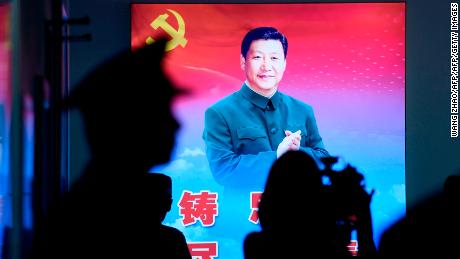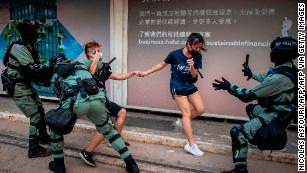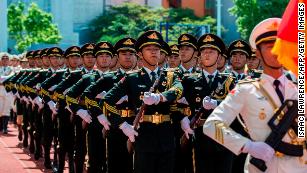China President Xi Jinping's balancing act over Hong Kong
Hong Kong's summer of discontent has spilled over into fall, bringing with it tear gas, petrol bombs and widespread transport disruptions -- all the elements that have divided the city during four months of unrest.
Observers had looked to China's National Day on October 1 as a potential turning point for the protests, and since then they've escalated with protesters targeting businesses linked to mainland China.
The vandalism and violence poses a direct challenge to Chinese President Xi Jinping, who is not known for his tolerance of views that differ from the ruling Communist Party.
However, it is not clear if Beijing has a red line, and what it would take for protesters to cross it before provoking a Chinese military response.
Chinese military intervention in Hong Kong is still believed to be the last resort, as it would carry disastrous consequences for both the territory and mainland China.
But experts say the Hong Kong government's failed efforts to stop the protests by evoking emergency powers could move Hong Kong closer to a more aggressive response from Beijing.
Balancing act
Xi, who effectively made himself "president for life" by dropping presidential term limits in 2018, is China's most powerful leader since Mao Zedong.
He is set to convene a high-level Communist Party meeting later this month and will want to protect his image of a tough nationalist leader that's driving China to a more prosperous future.
"He faces potentially embarrassing questions over Hong Kong as the situation is not under control after four months," said Willie Lam, adjunct professor at the Chinese University of Hong Kong. "He cannot be appear to be weak, otherwise he will lose face."
For a few months, China embarked on a propaganda campaign and social media blitz to demonize the Hong Kong protesters. Now, all mention of the protests are blocked once again as a topic on social media in the mainland.
Chinese state media continuously reinforces its message that they are dangerous, out-of-control separatists influenced by foreign forces, and that the Chinese military or armed police could be sent in at a moment's notice to crush them.
Hong Kong's violent protests show no sign of stopping. Some are deciding it's time to leave
In reality, such a response could destabilize Hong Kong and China's economy, destroy Xi's global reputation and disrupt long-term plans for political and social assimilation of Hong Kong with the mainland.
"You can send in the troops but unless you suppress the protesters with overwhelming force then you're just going to require continued occupation," said Adam Ni, a China researcher at Macquarie University in Sydney.
Experts say armed intervention in Hong Kong would also provide political leverage for Xi's factional opponents.
"There are political forces within the Chinese Communist Party that would like to see him slip up as a way to justify removing him as president for life," said Malcolm Davis, senior analyst in Defense Strategy and Capability at the Australian Strategic Policy Institute.
Xi will also be thinking of cross-strait relations with Taiwan, which have only worsened since the Hong Kong protests began in June. While Taiwan has been self-ruled since the end of the Chinese civil war in 1949, Beijing has not given up its desire for reunification through political negotiations.
"There's no way that they are going to sign up to any peaceful negotiation with the Chinese, given what's happening in Hong Kong. So ultimately, Xi may be forced into a bigger risk with Taiwan as a result of what's happening," said Davis.
Economy
Analysts say if People's Liberation Army (PLA) troops or the paramilitary People's Armed Police cracked down in Hong Kong, the stock market and housing market would crash and a mass exodus would likely follow.
Hong Kong is an important global financial and business center, with foreign companies and investors seeing the city as a stable gateway to Asia.
Already, the protests are having an impact on Hong Kong's economy, but Chinese boots on the ground would seriously damage its image as a safe and open place to do business. Such instability caused by an armed intervention could prompt corporations to reconsider their investment in the city.
"It's possible that multinational companies, or companies listed on the Hong Kong stock market may think of moving to Singapore or another financial center in Asia Pacific," Lam said.
Chinese companies use the Hong Kong stock market to raise capital and many powerful Chinese elites who have invested heavily in Hong Kong would stand to lose huge amounts of money in the event of an economic collapse, Lam added.
About half of all the foreign direct investment into China last year came through Hong Kong. And a similar percentage of investment from China flowed into Hong Kong, according to the Hong Kong Trade Development Council. The figures are in the hundreds of billions of dollars.
China is also fighting a bitter trade war with the US, dealing with a slowing economy, and the strains of building the Belt and Road Initiative -- Xi's signature global infrastructure policy that aims to build new trade routes linking China to Asia, Africa and Europe.
"Hong Kong is still the major place where the Chinese economy raises cash to finance its modernization programs," Lam said. "They want to raise more money and they need Hong Kong actually more than ever."
A military crackdown in Hong Kong would backfire on China's economy
A bloody crackdown akin to the 1989 Tiananmen massacre would also damage China's image in the eyes of many in the region. Xi is risking sanctions and important diplomatic and economic relations being severed.
"Armed intervention in Hong Kong just adds to the narrative of a threatening China," Ni said.
Playing into Beijing's hand, however, is the power it holds over multinational companies afraid of losing lucrative business on the mainland. And Beijing has been quick to take punitive measures against companies that show support for the protests.
Hong Kong's flagship aircraft carrier Cathay Pacific has borne the brunt of Chinese pressure, which has even extended to US entities like the NBA and video game company Blizzard Entertainment who have become embroiled in disputes over Hong Kong.
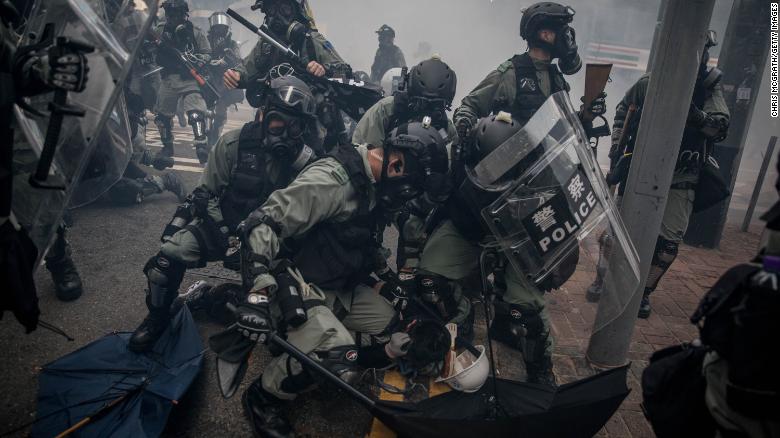
Police tackle and arrest protesters during clashes in Hong Kong's Wan Chai district on October 1, 2019.
'Can't go on forever'
The protests, now entering their 19th weekend, have become increasingly violent and destructive, particularly following Hong Kong Chief Executive Carrie Lam's use of emergency powers on October 5 to ban face masks at public gatherings.
Police have also ramped up their response -- two protesters were shot with live ammunition on two separate occasions since October 1, marking a turning point in the four month-long civil unrest.
"They (Beijing) can't let this go on indefinitely. They can't let it continue to intensify," said Davis. "I think that we are in the stage now, where things are going to slide towards some sort of military or People's Armed Police intervention. And that could be a devastating situation for the protesters."
But no one knows where that line is. Analysts say it's still a question that Beijing is actively considering.
"It's smart not to state a clear red line because you are going to have to act on it to keep your credibility once that line has been breached. And there is every likelihood that protesters would actively seek to breach that line," Ni said.
That line could also be crossed if Beijing loses confidence in the Hong Kong government's ability to win the struggle, Ni added.
The Hong Kong government can request assistance from the Hong Kong PLA garrison "in the maintenance of public order and in disaster relief." Though analysts say China's paramilitary police -- the PAP -- who would be more likely to be deployed in Hong Kong as they are specifically trained to put down social unrest on the mainland.
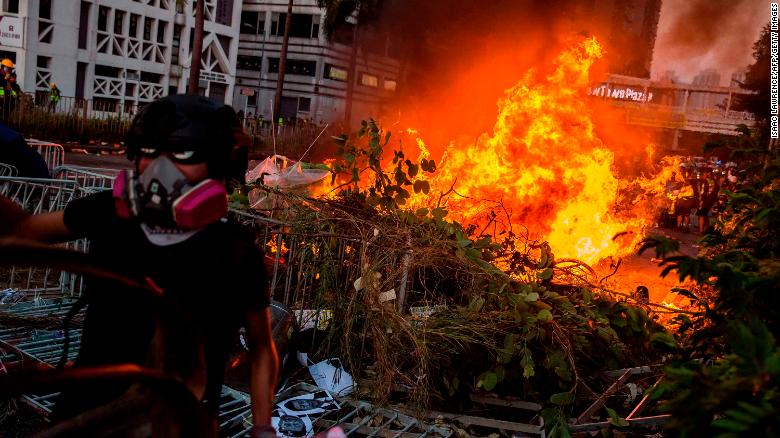
A fire lit by protesters burns in the Sha Tin district of Hong Kong.
At a press conference Tuesday, Chief Executive Lam said she believes the Hong Kong government "should find the solutions ourselves," but that her government could still call on Beijing for assistance.
"No options should be ruled out," she said.
Using emergency powers is one way Xi and Lam can attempt to keep a firm hand on the situation, without resorting to boots on the ground.
While invoking the Emergency Ordinance Regulation to pass an anti-mask ban did nothing to quell the protests, it does allow police to make more arrests, said Lam, the Hong Kong politics expert.
"Overall, the order from Beijing is the Hong Kong government should apply the rules more stringently and make more arrests. And, if a sizable number of ringleaders are arrested then it will help the Lam administration to restore order sooner," he said.
Since the protests began, 2,363 people between the ages of 12 and 83 have been arrested, and 77 since the mask law came into effect, according to Hong Kong police.
The NBA is feeling China's wrath. Here's what other businesses can learn
Lam added that more draconian measures could be enacted under emergency powers, if protests continue to intensify.
But there is little sign protesters will stop any time soon and the mask ban has only added fuel to the fire. As far back as August, some radical protesters said they welcomed a crackdown and were "ready for it," no matter the costs to the city and potentially the movement itself.
"The fundamental contradiction here at the heart of this unfolding crisis is that, on the one hand you have Hong Kongers wanting to maintain Hong Kong's autonomy as promised when the territory was handed over to China by the UK. And on the other is Beijing's desire to tighten Hong Kong's institutions, reduce its autonomy and integrate it into PRC's political systems," Ni said.
Lam, the Hong Kong politics expert, said Xi will be hoping that public opinion will soon swing away from the protesters and the more hardcore elements of the movement, if the violence and vandalism further disrupt daily life.
But if the waiting game doesn't pan out, Xi may be forced to put the future strength and stability of the party ahead of potentially severe economic consequences.
"I don't see this ending peacefully, I don't see both sides, stepping back from the brink," China analyst Davis said.
News Courtesy: www.cnn.com

